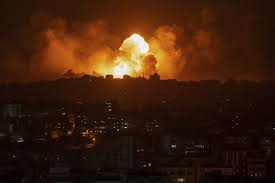Germany shifts stance, threatens steps against Israel over Gaza offensive

Germany has recently shifted its stance on Israel’s military offensive in Gaza. This change marks a break from decades of strong support for Israel. The new position reflects growing concerns about the humanitarian crisis in Gaza and rising civilian casualties.
Historic Support Under Pressure
Germany has supported Israel strongly due to the Holocaust’s legacy. This history has driven close political and military cooperation. However, recent events in Gaza have put this bond under strain. German leaders now question the scale of Israel’s military actions.
Chancellor Merz’s Strong Criticism
Chancellor Friedrich Merz made the clearest critique so far. He called the ongoing airstrikes in Gaza “no longer comprehensible” or “justifiable.” Merz’s words show deep unease with the operation’s human toll. This stance signals Germany’s readiness to reconsider its policies.
Foreign Minister’s Warning
Foreign Minister Johann Wadephul stressed that Germany’s historic support should not excuse any military action. He warned against justifying operations that harm civilians. Wadephul emphasized Germany’s demand for adherence to international law. This warning shows frustration over Israel’s conduct.
Rethinking Arms Exports
Germany has supplied Israel with advanced weapons for years. Now, German lawmakers and civil groups urge a halt to arms exports. The government said it will not approve exports that violate humanitarian laws. This cautious approach contrasts with past policies.
Shift in Public Opinion
German public opinion also changed. Only 36% now view Israel positively, down from higher levels in the past. Just 25% believe Germany has a special obligation to protect Israel. These numbers reflect increased empathy for Gaza’s civilians.
European and Global Context
Germany’s shift follows concerns voiced by other Western countries. The EU, UK, France, and Canada urge restraint and call for peace talks. Germany, as the EU’s largest member, plays a key role in shaping these policies.
Worsening Humanitarian Crisis
The humanitarian situation in Gaza has worsened sharply. Israeli airstrikes destroyed hospitals, schools, and vital infrastructure. Thousands have fled their homes. Aid groups report shortages of food, water, and medicine.
Germany increased humanitarian aid to Gaza. Yet, Berlin insists that aid alone cannot replace a ceasefire. It calls for urgent political solutions to end the suffering.
Diplomatic Moves Ahead
Chancellor Merz plans talks with Israeli Prime Minister Benjamin Netanyahu. They will discuss balancing Israel’s security and protecting civilians. Germany may review military cooperation and arms export agreements. It aims to ensure its support aligns with human rights standards.
Conclusion
Germany’s new stance marks a critical shift in the Middle East policy. It reflects a broader call for accountability and respect for humanitarian law. This move may influence other countries’ approaches to the conflict. The coming weeks will show whether diplomacy can ease tensions and save lives.






